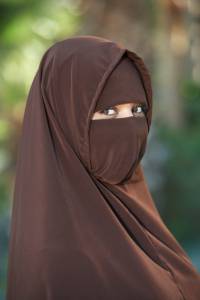Strangely enough, one of the most volatile election controversies surrounds a woman’s right to wear the niqab during citizenship ceremonies. The niqab is a veil that covers the face, not the whole body. At question isn’t that the woman won’t have to remove the veil to prove her identification before the ceremony, but whether she can wear it when she repeats her vows of citizenship. Just a few weeks ago, The Federal Court of Appeals ruled that women have the right to wear the niqab if they choose. That doesn’t seem to be the end of the matter.
What Is the Issue?
Prime Minister Stephen Harper, who represents the Conservative party, is ready to appeal the Federal Court’s decision. He states that wearing the niqab is offensive and not how things are done in Canada. One survey reported that about 80 percent of Canadians agree with him, and he is using this as part of his campaign strategy. Harper has also looked at a ban on niqabs for public servants, stating it as a need to reveal one’s identity. Others say that the stance is fueling anti-Muslim emotions.
Is the Debate Fueling Anti-Muslim Sentiment?
Women are being attacked for wearing the niqab and hijab when they are out in public. One report identified a pregnant Muslim woman who fell down when two teenagers tried to rip off her hijab. Another woman was elbowed in the Toronto mall for wearing the Niqab. She believes she was singled out because of her faith.
This behavior would not be tolerated if it were Catholic nuns or Orthodox Jews. Canada has long been a proponent of religious freedom, and the niqab and hijab are symbols of a woman’s faith. Canada’s Charter of Rights and Freedoms clearly outlines that basic human rights are violated when one particular practice is subject to censure.
Try to Understand Another Side
To many people in the Western world, wearing the niqab or hijab seems to be a symbol of women as chattel or servants. This goes against the values on which the country was founded, on the notion that everyone has autonomy and individuality. It seems reprehensible to mandate that a woman must wear the veil to maintain her honor, especially in today’s society.
Whether the majority agrees with Harper or not, the issue isn’t a decision for the majority. This issue is about human rights. Does an adult woman have the right to make a choice for herself about whether she wears the niqab or hijab? Survey after survey has reported that Muslim women wear the veil out of their own choice, not because they are forced to wear it by their husband or father.
In many Orthodox churches in Russia, woman are asked to wear a shawl when they enter the church. This applies even if they are just coming in to tour the building, not worship. It is expected that you honor and respect their tradition, no matter what your background is. It’s simply a courtesy that demonstrates reverence to the culture and heritage. How can it be okay to ask Muslim women to give up their traditions because they have moved to another country?
The Debate Will Continue Long After the Election
Harper is not wrong in some of his sentiments. Women should not be considered chattel and be forced to wear the niqab. On the other hand, they should also not be forced to take off the veil. It should be their own choice. You may agree that the niqab is offensive, but put yourself in her place. How would you want to be told how to dress instead of being able to honor your faith and traditions?



